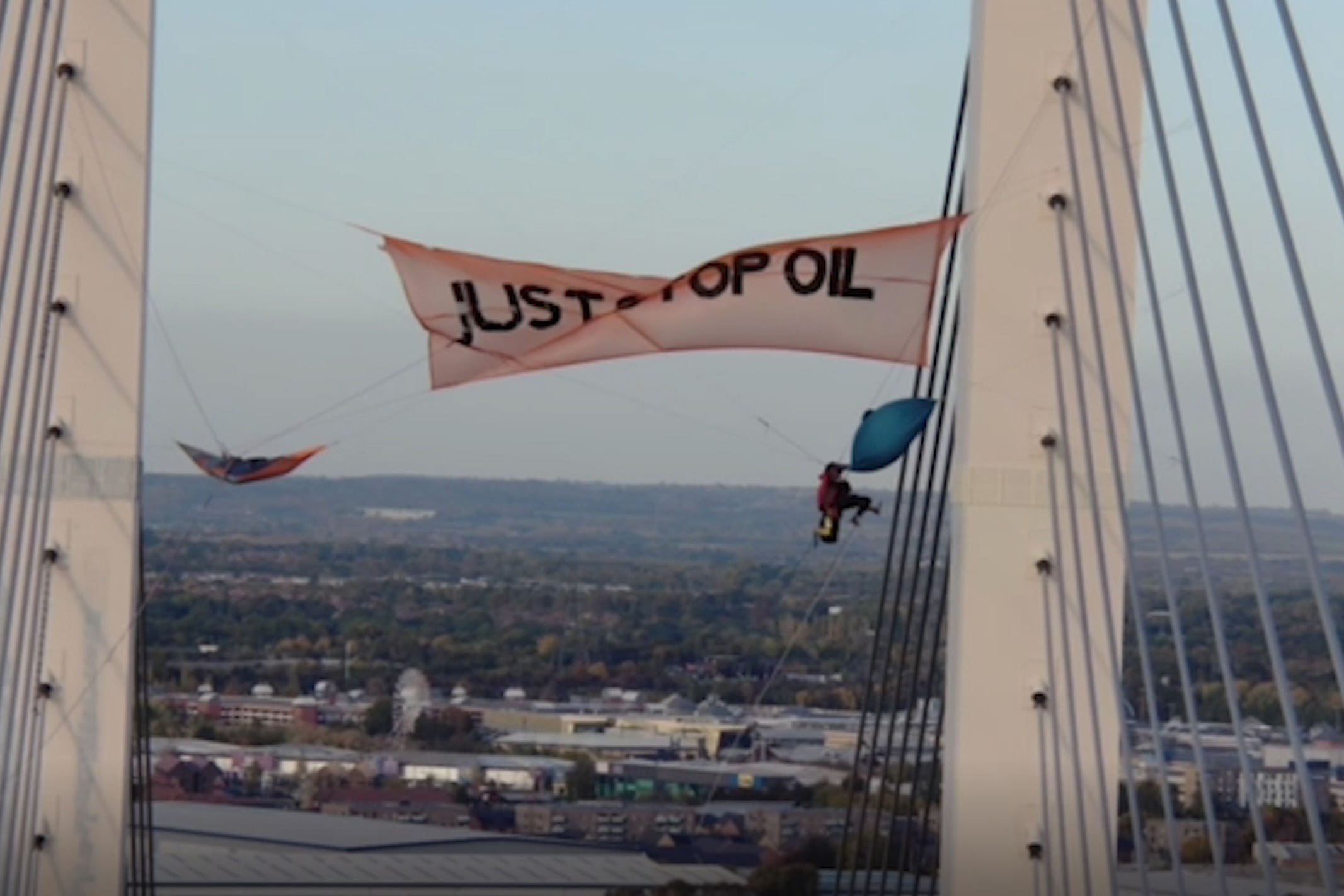Rishi Sunak hits back at UN criticism of long sentences for climate protesters
The Prime Minister said it was ‘entirely right that selfish protesters’ are handed ‘tough sentences’.

Rishi Sunak has hit out at a warning from the United Nations that lengthy sentences for climate protesters could curb freedoms in the UK.
The Prime Minister said it was “entirely right” to hand “tough sentences” to demonstrators who cause major disruption.
The comments were in response to Ian Fry, the UN’s special rapporteur on the promotion and protection of human rights in the context of climate change, raising concern at the sentences handed to Just Stop Oil campaigners who scaled the Dartford Crossing in October 2022.
Morgan Trowland, 40, and Marcus Decker, 34, were jailed for three years and two years and seven months respectively after using ropes and other climbing gear to scale the Queen Elizabeth II Bridge, causing gridlock across two days when police closed it to traffic.
It's entirely right that selfish protesters intent on causing misery to the hard-working majority face tough sentences
Mr Fry, in a letter to a UK Government representative sent in August, said the sentences were “significantly more severe than previous sentences imposed for this type of offending in the past”.
The special rapporteur said he was “particularly concerned” about the sentencing of the “environmental human rights defenders” in relation to their “rights to freedom of expression and freedom of peaceful assembly and association”.
He added: “I am gravely concerned about the potential flow-on effect that the severity of the sentences could have on civil society and the work of activists, expressing concerns about the triple planetary crisis and, in particular, the impacts of climate change on human rights and on future generations.”
He asked how Trowland and Decker’s sentences were “compatible with international norms”, such as the International Covenant on Civil and Political Rights, which the UK has ratified.
But the Prime Minister defended the Government’s approach, saying: “Those who break the law should feel the full force of it.”
Conservative Party leader Mr Sunak tweeted: “It is entirely right that selfish protesters intent on causing misery to the hard-working majority face tough sentences.
“It’s what the public expects and it’s what we’ve delivered.”
Last month, Trowland and Decker lost a bid to challenge their sentences at the Supreme Court, the UK’s highest court.
In July, the protesters lost an appeal over what their lawyers said was the “extraordinary length” of their jail terms for the direct action on the crossing over the River Thames in south-east England.
In their ruling, the judges acknowledged the “long and honourable tradition of civil disobedience on conscientious grounds” and that the sentences handed to Trowland and Decker went “well beyond previous sentences imposed for this type of offending”.
But Lady Chief Justice Lady Carr said the jail terms were “not excessive” and reflected “Parliament’s will” under new laws enacted under the Police, Crime, Sentencing and Courts Act last year.
The legislation introduced a new “fault-based public nuisance offence for what obviously will include non-violent protest behaviour, with a maximum sentence of 10 years’ imprisonment”, the appeal judges said.
Lady Carr said the sentences met the “legitimate” aim of deterring others from such offending.
Just Stop Oil shared a message Trowland issued from prison following the UN’s intervention in his and Decker’s case.
Trowland said: “The sentences given to myself and Marcus Decker demonstrate that our Government is determined to protect those who are planning climate genocide.
“It’s people vs oil and our Government has signalled that it is on the side of oil.”
The two men’s trial, held at Basildon Crown Court in spring 2023, was told the QEII bridge was shut from 4am on October 17 until 9pm the next day, sparking traffic jams as motorists were forced to use tunnels instead.
Structural engineer Trowland, of Islington, north London, and private tutor Decker, of no fixed address, denied causing a public nuisance, arguing it was a protest.
The jury was told the protesters ascended to a point close to 200ft above the road and unfurled a “giant Just Stop Oil banner” and “rigged up hammocks and stayed there”.
The men came down at about 5.30pm on October 18 “with the help of police and a very tall cherry picker crane”, but the bridge, which links the M25 in Essex and Kent, was not reopened to traffic until later.
Essex Police said those affected by the disruption included a “heavily pregnant woman who needed urgent medical help”.
Another person missed the funeral of their best friend of 35 years, the force said, and a business lost more than £160,000 in earnings.
In April, a jury unanimously found Trowland and Decker guilty of causing a public nuisance.
Just Stop Oil says Decker, a German citizen who the group said has leave to remain in the UK, faces deportation after serving his sentence.
Trowland has six previous convictions relating to protests, while Decker has one, with lawyers for the pair previously saying they would not take part in further disruptive protests.
The Prime Minister’s official spokesman said judges had the UK Government’s “full backing” to use the new powers given to them by MPs to punish those carrying out disruptive protests.
Mr Sunak’s spokesman told reporters: “While it is not for us to comment on specific decisions of the court, it is entirely right that the courts … use the tough new powers that Parliament has granted and they have our full backing to do so.”
The Office of the United Nations High Commissioner for Human Rights has been contacted for comment.
Bookmark popover
Removed from bookmarks